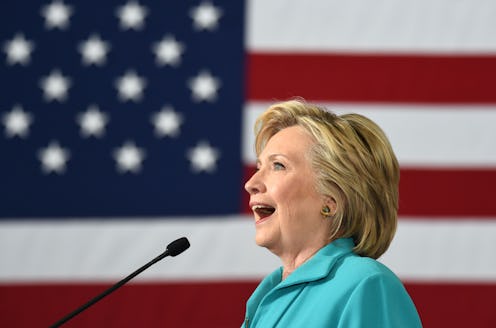News
Hillary Clinton's "American Exceptionalism" Speech
Hillary Clinton gave a foreign policy speech at an American Legion hall in Ohio on Aug. 31 in which she distinguished her foreign policy from Republican presidential challenger Donald Trump's. But the speech was likely also an effort to reach out to Republican voters. In it, Clinton referred to America as an "exceptional nation" and as "the indispensable nation." Her support of American exceptionalism, a commonly-espoused belief on the right, is likely not going to do her any favors with more left-leaning voters.
American exceptionalism generally entails the belief that America has a responsibility to encourage democracy around the globe, and that it must maintain a strong military. When used critically, the term often stands for the belief that America is superior to other nations and that it meddles inappropriately in other countries' affairs. Clinton told the crowd on Wednesday that the United States has a "unique and unparalleled ability to be a force for peace and progress," Associated Press reported. She highlighted that this approach differs from Trump's "America first" tack.
The speech came on the heels of garnering the endorsement of James Clad, deputy assistant secretary of defense under George W. Bush, and was likely intended to make herself more appealing to Republican and right-leaning independent voters who are disenchanted with Trump. Her support of American exceptionalism hearkens back to her pro-interventionist record as secretary of state, in which role she supported a coup in Honduras and an airstrike campaign in Libya, events which have been tied to worsening conditions in each country. Her support of such interventions, as well as her vote for the Iraq War as a senator, became some of the most oft-touted criticisms of her during the primaries from Democratic challenger Sen. Bernie Sanders.
Clinton opened herself up pretty wide to a potential renewal of that criticism on Wednesday when she said, "People all over the world look to us and follow our lead. When America fails to lead, we leave a vacuum that either leaves chaos, or other countries rush in to fill the void." The power vacuums left in Iraq and Libya following U.S. interventions are generally accepted to be a big part of what primed the area for the eventual rise of ISIS.
Clinton no longer has Sanders to criticize her foreign policy record on the campaign trail, but, highlighting the unconventional nature of this election season, it's her Republican challenger who's taking up that charge in the general election. Trump has been critical of Clinton-supported interventions abroad, claiming that they led to increased terrorist activity, Politico reported. But she's not shying away from that record or from employing conservative language when discussing foreign policy, and she appears to believe it will bring in conservatives without alienating too many progressives.
